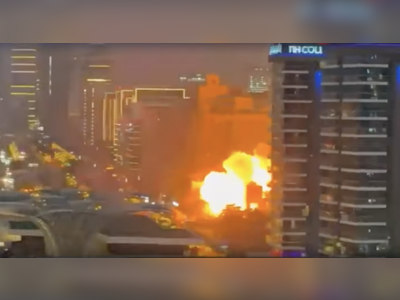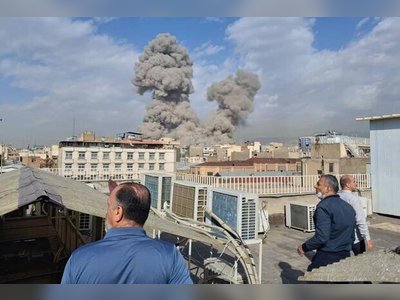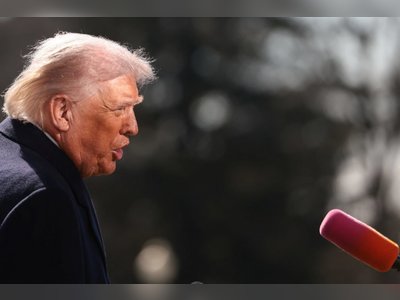India-Pakistan conflict may be first test for Chinese military tech
Recent aerial confrontations could serve as a significant assessment of Chinese defense systems against Western military equipment.
The recent escalation of hostilities between India and Pakistan has highlighted the possible implications for the performance of Chinese military technology in real combat scenarios.
Following a reported aerial engagement, shares in China's AVIC Chengdu Aircraft surged by 40%, reflecting growing investor interest in the advanced J-10C fighter jets produced by the company.
Pakistan claimed on Wednesday that its J-10C jets successfully shot down five Indian combat aircraft, including the French-made Rafale, during a confrontation that involved approximately 125 aircraft and ranged over 160 kilometers (100 miles).
No official acknowledgment of aircraft losses has come from India, which has not commented on Pakistan's assertions regarding the involvement of Chinese-made jets.
As the primary arms supplier to Pakistan, China maintains a keen interest in the real-world performance of its military exports.
Over the past five years, approximately 81% of Pakistan's imported weapons have originated from China, including advanced fighters, missiles, and radar systems.
Analysts suggest that the conflicts between India and Pakistan may inadvertently create a testing ground for Chinese military hardware in a regional context fundamentally reshaped by recent geopolitical alignments.
The historical context of the India-Pakistan conflict includes three wars since their independence from Britain in 1947, with significant prior alignments during the Cold War, where the Soviet Union supported India while the United States and China aided Pakistan.
Presently, the strategic landscape has shifted, with Indian defense procurement increasingly favoring the U.S. and its allies, including France and Israel, in contrast to Pakistan's reliance on China.
From 2008 onwards, U.S. arms supplies to Pakistan have dwindled amid accusations of insufficient anti-terror efforts and concerns regarding Pakistan’s nuclear program, prompting Islamabad to pivot towards its relationship with Beijing.
China’s military support has deepened, with substantial collaborations in training and advanced weapons systems deployment, such as the AI-enabled targeting technology.
The recent violent exchanges were ignited by the killing of 26 tourists in Indian-administered Kashmir, subsequently leading to Indian missile strikes aimed at alleged terrorist infrastructure across the border.
The combat engagement, described by some analysts as possibly the most intense aerial confrontation between nuclear-armed nations in decades, further illustrates the rising tensions and the potential consequences of advanced military technology deployment.
Analysts indicate that validation of claims concerning the effectiveness of Chinese systems could boost the country's defense exports internationally, particularly in markets typically closed to Western arms.
Recent reports suggest that the J-10C, which is equipped with current-generation radar and weaponry, may have effectively countered Indian Rafales, raising questions about the integration and operational readiness of India's air force capabilities.
This atmosphere of escalating military readiness and resource allocation reflects a broader realignment of strategic partnerships in South Asia.
As each nation positions itself in the context of global defense markets, the implications of their military engagements could resonate beyond regional conflicts, raising questions about the effectiveness of current military strategies and alliances.
As tensions continue to mount, both China and Pakistan appear to be reiterating their supportive ties, with Chinese officials advocating for restraint in the conflict.
The long-term impact of these developments on the regional power balance and military confidence remains to be seen, particularly with regard to the future trajectory of Chinese military technology and its perceived effectiveness against Western counterparts.
Following a reported aerial engagement, shares in China's AVIC Chengdu Aircraft surged by 40%, reflecting growing investor interest in the advanced J-10C fighter jets produced by the company.
Pakistan claimed on Wednesday that its J-10C jets successfully shot down five Indian combat aircraft, including the French-made Rafale, during a confrontation that involved approximately 125 aircraft and ranged over 160 kilometers (100 miles).
No official acknowledgment of aircraft losses has come from India, which has not commented on Pakistan's assertions regarding the involvement of Chinese-made jets.
As the primary arms supplier to Pakistan, China maintains a keen interest in the real-world performance of its military exports.
Over the past five years, approximately 81% of Pakistan's imported weapons have originated from China, including advanced fighters, missiles, and radar systems.
Analysts suggest that the conflicts between India and Pakistan may inadvertently create a testing ground for Chinese military hardware in a regional context fundamentally reshaped by recent geopolitical alignments.
The historical context of the India-Pakistan conflict includes three wars since their independence from Britain in 1947, with significant prior alignments during the Cold War, where the Soviet Union supported India while the United States and China aided Pakistan.
Presently, the strategic landscape has shifted, with Indian defense procurement increasingly favoring the U.S. and its allies, including France and Israel, in contrast to Pakistan's reliance on China.
From 2008 onwards, U.S. arms supplies to Pakistan have dwindled amid accusations of insufficient anti-terror efforts and concerns regarding Pakistan’s nuclear program, prompting Islamabad to pivot towards its relationship with Beijing.
China’s military support has deepened, with substantial collaborations in training and advanced weapons systems deployment, such as the AI-enabled targeting technology.
The recent violent exchanges were ignited by the killing of 26 tourists in Indian-administered Kashmir, subsequently leading to Indian missile strikes aimed at alleged terrorist infrastructure across the border.
The combat engagement, described by some analysts as possibly the most intense aerial confrontation between nuclear-armed nations in decades, further illustrates the rising tensions and the potential consequences of advanced military technology deployment.
Analysts indicate that validation of claims concerning the effectiveness of Chinese systems could boost the country's defense exports internationally, particularly in markets typically closed to Western arms.
Recent reports suggest that the J-10C, which is equipped with current-generation radar and weaponry, may have effectively countered Indian Rafales, raising questions about the integration and operational readiness of India's air force capabilities.
This atmosphere of escalating military readiness and resource allocation reflects a broader realignment of strategic partnerships in South Asia.
As each nation positions itself in the context of global defense markets, the implications of their military engagements could resonate beyond regional conflicts, raising questions about the effectiveness of current military strategies and alliances.
As tensions continue to mount, both China and Pakistan appear to be reiterating their supportive ties, with Chinese officials advocating for restraint in the conflict.
The long-term impact of these developments on the regional power balance and military confidence remains to be seen, particularly with regard to the future trajectory of Chinese military technology and its perceived effectiveness against Western counterparts.












